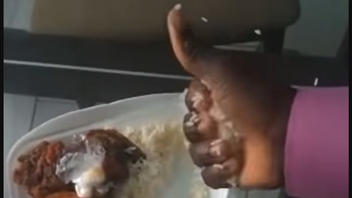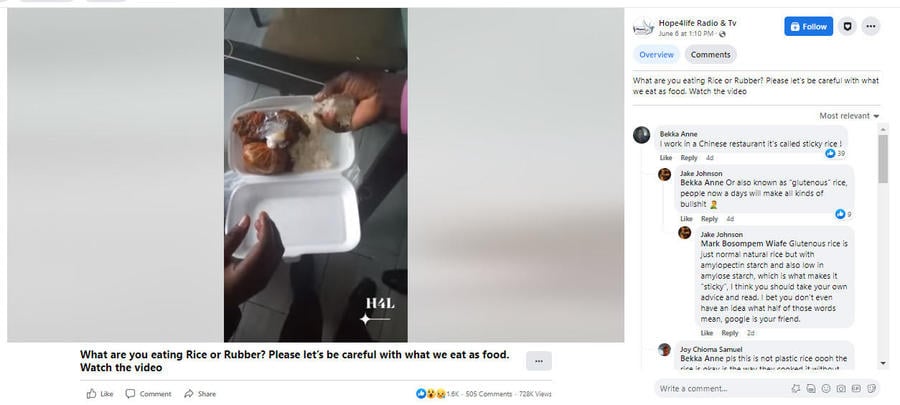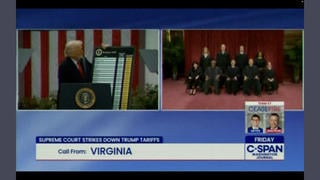
Is the supply of rice in the United States or Ghana corrupted with a fake rice product containing plastic or rubber that is making people sick? No, that's not true: Rumors about plastic rice have circulated around the world since at least 2011 -- but no evidence of such a counterfeit food has been found. These claims about fake rice have been countered by many of the national bodies regulating food safety in the nations where these rumors appear, most recently in Ghana, where the Food and Drugs Authority Ghana issued a statement on June 9, 2022, that said "... the videos of the alleged plastic rice are false and must be ignored."
The original fake rice claims, which seem to have sparked the rumors about plastic rice, circulated in 2011 and were debunked by snopes.com in 2016. One example can be seen in a video published on January 23, 2011, on YouTube titled, "Watch out for plastic rice from china." More on this video later. These rumors have circulated around the world for years. On June 6, 2022, a video was published by the Facebook page Hope4life Radio & Tv. It is captioned:
What are you eating Rice or Rubber? Please let's be careful with what we eat as food. Watch the video
This is how the post appeared on Facebook at the time of writing:
(Image Source: Facebook screenshot taken on Tue Jun 14 16:20:29 2022 UTC)
In this video a person uses their hand to form some cooked rice from a take-out container into a small ball. This ball is then thrown repeatedly at the floor where it bounces lightly, appears springy and does not fall apart. There are other people in the room who also make comments. The 2:20-minute-long video transcription says:
Speaker 1: Okay, hello everybody. We will have heard about this rubber rice, plastic rice. I mean potato rice ... rice, rice, rice, rice and then we also bought this rice and we decided to experiment to see what kind of rice we are consuming. So then we bought our rice, and then we decided to test it just like everybody does. So, we took a sample and then we try to squeeze it together. Not so hard but just squeeze it together.
Speaker 2: It looks like normal rice on the onset. But
Speaker 3: You can't just believe this. This is unbelievable. This is unbelievable. Just look at this. Look at this. Look at this. Look at this ...Speaker 1: And again. OK, So we are urging everybody to stay away from eating rice because most of the rice we're consuming is just so bad with plastic contains or rubber contains. This is when you go to the hospitals that longer queues with so many people getting sick here and there. And it's all because of what we consume. FDA Food and Drugs Authority, please you have to be up and doing, be up and doing your work well. You're killing innocent Ghanians. We can't keep on with this. Most of the rice imported into the country are plastic please. Please be absolutely game and then people don't eat rice outside. Don't buy rice outside. Make sure you eat your local Ghanian dishes. They are good. You can get local rice, brown rice, and you're good to go.
Speaker 2: Exactly. I think I also add general public to go for local rice so that can prevent some of these things. Thank you very much. Please help to spread this video out.
The Hope4life Facebook channel is marked as being located in Woodbridge, Virginia, in the United States, but much of the content features topics from Ghana. The website's "about us" page describes their mission this way:
Hope4Life Radio Foundation (HRF), a nongovernmental organization, seeks to inform, educate and entertain African in the US (especially those living in the Washington, DC, Maryland and Virginia - the DMV area) to live better lives using qualified personnel, innovative technology (social media) and best practices and also donate to selected needy people in African countries like Ghana.
Because the name of the FDA is similar both in Ghana and the United States, it is not clear exactly which country this broad warning is intended for, but either way the warning is a false alarm. On June 13, 2022, the Ghana News Agency gna.org published an article titled, "No plastic rice in Ghana - FDA." The article says, "The Food and Drugs Authority (FDA) has refuted claims of plastic rice on the Ghanian market." In a June 9, 2022, Food Safety press release, the FDA Deputy Chief Executive Officer, Seth K. Seaneke, referred to a document regarding the FDA's 2017 investigation into the plastic rice question in Ghana. This pdf document titled, "FDA STATEMENT ON RUMOURED 'PLASTIC' RICE ON THE GHANAIAN MARKET." explains:
The physical and chemical properties of plastics are such that they ordinarily cannot be reconstituted into edible food. This is because plastics cannot absorb water and do not mix with water.
The textural properties of rice varieties are due to the nature of their starch content, that is the ratio of amylose to amylopectin, the constituents of starch. Amylopectin is responsible for the sticky nature of rice and its quantity is affected by the varietal differences. This character of the starch in rice enables cooked rice grains to agglomerate and allow it to be kneaded into a malleable sphere that can bounce off hard surfaces as depicted in some of the videos on social media. Amylose is responsible for the gelatinous nature of rice and therefore contributes to the bouncy property of the rice when made into balls. The varieties of rice that contain a higher quantity of Amylose will produce greater bounce whilst those with higher amylopectin will bounce less.
All shipments of rice Imported to the United States are inspected upon arrival by the U.S. Department of Agriculture. Lead Stories reached out to the USDA Animal and Plant Health Inspection Service and will update this article if appropriate.
The likely origin of this plastic rice rumor had to do with dishonest business practices where rice dealers were substituting a cheaper variety of rice and representing it as Wuchang rice, a more popular, scarce and expensive variety. Some rice dealers were even spraying rice with a fragrance to try to match the aroma of the fancy variety. The "fake rice" in question was not artificial rice made out of plastic, it was real rice that was not authentic Wuchang rice. A January 23, 2011, YouTube video has a misleading clickbait title, "Watch out for plastic rice from china." The video does not show anything about plastic rice at all -- only a news segment about the Wuchang rice scandal.
Another baseless rumor was that potatoes, sweet potatoes and a plastic resin were combined to make a fake rice. An example of this is reported by koreatimes.co.kr on January 20, 2011.
'This "plastic rice" is made by forming potatoes and sweet potatoes into rice-like shape, then adding industrial synthetic resins,' said a food expert. 'Since the rice is different from normal rice, it is hard like stone even when cooked. Moreover, the synthetic resin in it is very harmful to the human body.'
This is not true. There is no evidence of a product like this found in any of the countries where the rumor circulated.
















